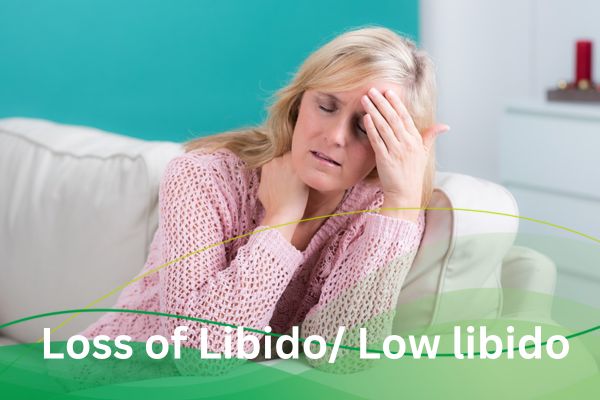Low Libido (Low Sex Drive)

Overview
Low libido, or diminished sex drive, is a prevalent concern that can affect both men and women. It is a common issue that may be temporary or long-term. In this article, we will delve into the various aspects of low libido, exploring its causes, symptoms, and effective management.
What is Low Libido (Low Sex Drive)?
Low libido (low sex drive) refers to a reduced interest or desire for sexual activity. Libido is complex and is influenced by biological, psychological, and social factors. Biologically, neurotransmitters (for example dopamine and oxytocin), and sex hormones (testosterone and estrogen). Libido is your overall sexual drive for sexual activity, which includes sex with a partner and masturbation. Various factors contribute to this condition, affecting individuals differently. Your sex drive can also change throughout your life. Some people feel to have sex every day some once a week and some not at all. The right libido depends on your preferences, lifestyle and life circumstances.
However, if a decrease in libido is causing you distress, it’s important to talk to a healthcare professional or mental professional. Understanding the causes and symptoms is crucial for effective management.
Several conditions and situations can lead to Low Libido, including:
- Medical Conditions
- Relationship issues
- Hormonal imbalances
- Certain medications
- Stress Aging
- Mental health conditions
How Common is Low Libido?
It affects 1 out of 5 men or people assigned male at birth and even more women or people assigned female at birth at some point in their lives. Low libido (low sex drive) is more prevalent than one might think. Many individuals experience periods of reduced sexual desire due to physical, psychological, or social factors. Recognizing the commonality of this issue is the first step toward seeking appropriate solutions.
Symptoms and Causes
What are the Symptoms of Low Libido?
The main symptom of low libido (Low sex drive) is a decrease in sexual desire compared to your regular interest in sex.
Other symptoms include the following:
- Lack of interest in sexual activity
- Difficulty in becoming sexually aroused.
- Inability to achieve orgasm.
- General dissatisfaction with one's sexual life.
What Causes Low Libido?
Many psychological, biological, and Social Factors may lead to low libido. The psychological and social factors that may lead to a decrease in sex drive in anyone can be of the below-mentioned category:
- Relationship Problems with Your Partner: Communication breakdowns and unresolved conflicts or trust or intimacy can impact your sexual desire and are the most common causes of a decrease in sex drive.
- Stress & Exhaustion: High stress levels and fatigue can significantly decrease libido. The reason for stress can be from work, family, or friends and this can lead to lower your sexual desire.
- Depression: Mental health conditions, including depression, can affect sexual desire and be a reason for low sex drive. Depression causes an imbalance of neurotransmitters that help regulate libido and the result of which depression causes low libido.
- Anxiety Disorders: Anxiety can create mental barriers to intimacy. Anxiety may cause increased levels of the hormone cortisol (the “stress hormone”). High levels of cortisol can suppress the sex hormones that impact your sex drive.
- Alcohol, Smoking, or Recreational Drugs: Drug consumption, and drinking excess amounts of alcohol can lead to a low libido (loss of sex drive). Smoking too can suppress your testosterone levels, which can cause a lowered libido. Substance abuse may contribute to low libido.
Some of the medical conditions that can lead to low libido are also provided below :
- Diabetes
- Headaches
- Cancer
- Hyperprolactinemia
- Hypertension
- Hypothyroidism
- Chronic pain
However, the medical conditions are not just limited to the above-mentioned conditions.
Low libido in women or people assigned as female at birth.
Low libido in women includes some medical conditions because of which such situation may arise and other factors that may be the reason are provided below:
- Sexual Dysfunction: Sexual dysfunction is a problem that can happen during any phase of the sexual response cycle. Issues such as painful sex, vaginal dryness, or problems reaching orgasm can create anxiety and lead to a decrease in sexual desire.
- Menopause and Perimenopause: During menopause and perimenopause, your ovaries decrease their production of estrogen, which is a reason for lowering the libido.
- Pregnancy and Breastfeeding: Uncomfortable physical symptoms and stress related to these life situations can also lead to lowering your libido. These processes involve large fluctuations in hormone levels, which can affect sex drive or lower it.
- Infections: Urinary tract infections (UTIs) or vaginal yeast infections are some of the temporary conditions that can result in a decrease in libido.
Low libido in men or people assigned male at birth.
Medical conditions that can lead to a decrease in sexual desire in men or people assigned male at birth include the below mentioned:
- Sexual Dysfunction: Erectile dysfunction, premature ejaculation or delayed ejaculation are some conditions that can create anxiety around sex and lead to a decrease in sexual desire.
- Low Testosterone: When your testicles don’t produce enough testosterone (a sex hormone) this medical condition is called male hypogonadism. This can happen at any age, but testosterone levels also decrease naturally.